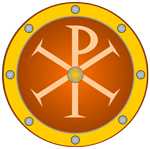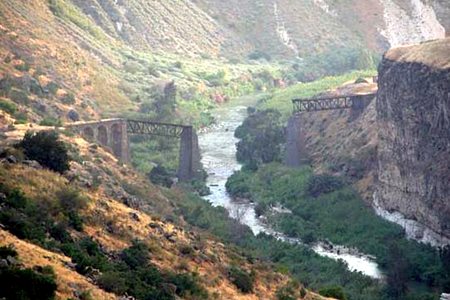
Battle of Yarmouk(Hieromyaks river) |
year: 63620 August 636 |
| A decisive defeat by the Arabs which led to the loss of Syria and Palestine | ★ ★ ★ ★ ★ |
|
enemy: Arabs
|
location: An upland region currently on the frontier between Israel, Jordan and Syria, east of the Sea of Galilee, 65 km south-east of the Golan Heights
|
accuracy:
●●●●●
|
|
battle type: Pitched Battle |
war: Arab Conquest of Syria |
modern country:
Jordan |
| ▼ The Byzantines(emperor: Heraclius) | ▼ The Enemies | |
| Commander: | Theodorus Trithurius, Vahan | Khalid ibn al-Walid |
| Forces: | Unreliable reports ranging from 50,000 to 200,000 | 20,000-40,000 |
| Losses: | 45% casualties | 4,000 |
| Background story: |
| After Muslims captured Damascus, Emperor Heraclius prepared for a major counterattack. A large army was assembled, consisting of contingents of Byzantines, Slavs, Franks, Georgians, Armenians and Christian (Ghassanid) Arabs. This force was organized into five armies, the joint leader of which was Theodore Trithourios the Sakellarios. Vahan, an Armenian noble and the former garrison commander of Emessa, was made the overall field commander. When this army started to move southwards, Muslim warlord Khalid ibn al-Walid abandoned Damascus and withdrew down the Jordan to the Yarmuk plain. |
The Battle: |
 Yarmouk river toady The Byzantine commanders did not manage to cope with this mounted force and use the sizable advantage of their army effectively. Their own cavalry never played a significant role in the battle and were held in static reserve for most of the six days. They never pushed their attacks and even when they obtained what could have been a decisive breakthrough on the 4th day, they were unable to exploit it. There appeared to be a decided lack of resolve among the Imperial commanders, though this may have been caused by internal and personal rivalry. On the 6th day of the battle, Khalid launched a well-planned, bold general attack. The Byzantines were out-maneuvered by the rapid movements of the Arabian cavalry and after fierce fighting the Byzantine army was disorganized, disordered and, finally, crashed. A general retreat started which resulted in more slaughtering, since Khalid had managed to block the exits of the plain. |
Aftermath: |
| It was one of the most important battles in World history. Its immediate effects were the loss of Syria and Palestine for the Byzantines. For ever. A millennium of Greco-Roman Levant came to an end. |
|
|
